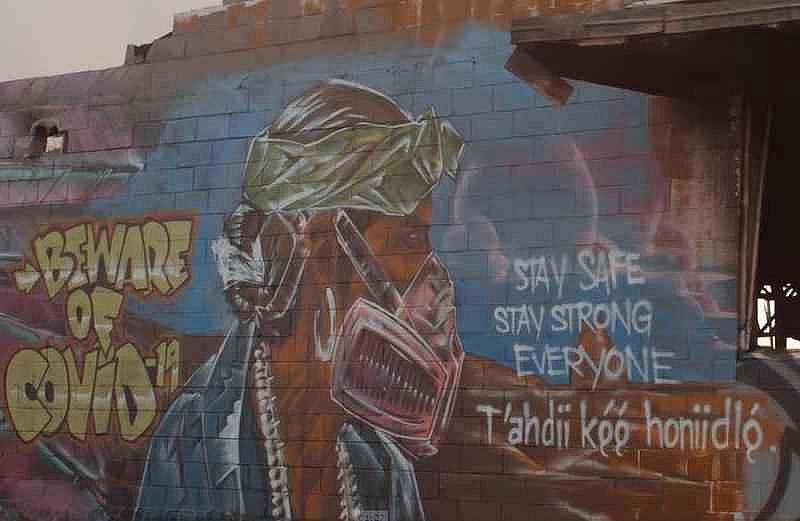How the Navajo People are using culture to fight back against 'Covid Monster'
This story was produced as a joint project led by Nathan O'Neal and Colton Shone, participants in the 2020 National Fellowship, a program of USC Annenberg's Center for Health Journalism.
Read their other stories here:
The People vs. the Pandemic: Overlooked
The People vs. the Pandemic: Addiction
Substance abuse complicating COVID-19 fight on Navajo Nation
Navajo mother has reservations about sending her children back to school
Tribal officials report progress on CARES Act projects on Navajo Nation
How far will CARES Act money go in solving the Navajo Nation water crisis?
The People vs. The Pandemic: The fight against the virus on Navajo Nation

ALBUQUERQUE, N.M. — KOB 4 continues its series on the coronavirus’ impact on the Navajo Nation and its people. Navajo leaders say using the culture in the fight against the virus is helping them win the battle, but they’re not letting their guard down just yet because the fight isn’t over.
On a late summer afternoon, Allie Young heads back to her roots.
“This is Kirtland, New Mexico,” she said.
The area where she grew up, along the Navajo Nation, is considered sacred land.
“If you can imagine it, there used to be a double-wide trailer back there,” she said as she gave a tour of her family homestead.
While her childhood home is no longer standing, the family hogan has stood against the test of time. It’s a traditional Navajo home where healing ceremonies still take place.
“My grandfather is a medicine man, so he helps people here in the hogan,” Young said.
She returned to her mom’s home in Farmington at the start of the pandemic. After years of living in Los Angeles and working in the entertainment industry, Young is home.
“Coming back here always feels new spiritually. I feel connected and reconnected," she said.
She’s using that renewed energy to help the Navajo Nation tackle coronavirus.
“I do a lot of work from my computer and phone calls,” she said as she pointed to her office-dining room combo. It’s where she launched a virtual movement of Navajo cultural preservation called Protect the Sacred.
Young showed us a video she helped produce detailing the Navajo origin story and its connection to the modern-day fight against coronavirus.
“The creation story for the Navajo people is one where twin warriors slay monsters that are hurting our people. The virus is another monster that we will overcome,” Young says in the opening of the video.
“I used to work for Indian Health Service in Shiprock. Their health promotion, so a lot of friends and physicians who still work there, they reached out to me and said, 'We need your help with some messaging, especially connecting with the youth', and I said absolutely,” she said.
With the help of her connections made in Hollywood, her campaign “Navajo Strong” went viral across Indian Country. Celebrities such as Mark Ruffalo and Marissa Tomei, among many others, showed solidarity with the Navajo people in short video messages.
"Because of what happened to us throughout history, our people and our population was decimated to 2% now of the entire population, and we have to protect that 2%. And so even one death is a lot for a native community,” Young said.
Helping to get that message out is Navajo Nation President Jonathan Nez who also appears in the video campaign. In many virtual meetings with tribal leaders, Nez says part of their coronavirus response has been framing the virus through a Navajo culture lens.
"Modern day monsters today are alcoholism, drug addiction, suicide, diabetes, cardiovascular disease and many, and now we have a new Monster COVID-19,” said Nez.
He says that cultural perspective along with some of the strictest public health orders in the country, which included 57-hour weekend lockdowns, have helped the Nation come down in cases. This after being the hardest hit per capita during the height of the pandemic.
"Wearing masks for instance—this is our armor. Public health experts have said during the winter could be an extreme wave and I'm praying that it doesn’t,” he said.
Health officials say more than 500 Navajo people have died from the virus. Sixty percent were over 60 years old.
Nez says he hopes his people keep “COVID monster” at bay by preparing. Designating supply gatherers for food, water, firewood. Also, keeping up with social distancing and prioritizing health.
“How do you prepare for that? You have to strengthen your immune system, right? You have to, you know, get your body prepared for physical activity, eating good foods, you know, with the indigenous fruits and vegetables that we harvest can help strengthen our immune system,” Nez said.
Young says keeping up with the traditional ways in a modern world can be challenging, but the pandemic has given her people a change to show a commitment to culture and resiliency.
"We've been able to really hold on to our traditional and the beauty way and to our medicine ways, into our language so many of our people still speak our language and it's beautiful to see that. That's what ‘Navajo Strong’ means to me, is that we never give up,” she said.
Colton Shone is a National Health Journalism Fellow. This story was made possible via partnership with the University of Southern California - Annenberg's Center for Health Journalism.
[This story was originally published by KOB4 and Diné (The People) v. The Pandemic.]

